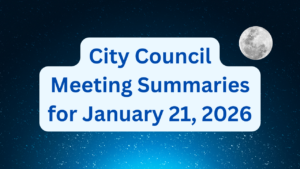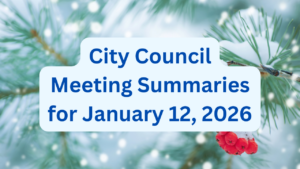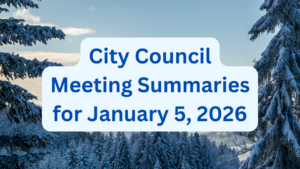
Disclaimer: The views I express here are my own and should NOT be construed as speaking for the City of Bangor or the City Council of Bangor. The following is a personal summary of public meetings written in my capacity as a private citizen. The opinions and interpretations expressed are my own and do not represent the official position of the City of Bangor or the Bangor City Council.
Highlights from Recent Bangor City Council Meetings
Here are some key topics that were discussed in public meetings this week:
- ARPA Funds: Projects funded by the American Rescue Plan Act (ARPA) were reported to be on schedule. Decisions will need to be made regarding the use of remaining ARPA interest money.
- ACREIHR Committee: The Council is proceeding with an amended ordinance that would create a due process for removing members from the Advisory Committee on Racial Equity, Inclusion, and Human Rights based on attendance.
- Public Health Partnership: Bangor Public Health was authorized to explore a partnership with Wabanaki Public Health. The goal is to potentially create a “one-stop shop” for health services for vulnerable residents, contingent on securing funding.
- Hampden Waste Facility: An update was provided on the reopening of the Hampden waste facility. It was clarified that Bangor will not pay directly for re-opening costs; instead, costs will be covered by regular waste fees, which were noted as being lower than the market rate.
- Emerald Ash Borer: Information was presented about the threat of the Emerald Ash Borer and the City’s plan to manage the infestation.
- City Finances: The Council received an update on the City’s finances for Fiscal Year 2025 and a preliminary look at draft sheets from the Fiscal Year 2024 Annual Comprehensive Financial Report, which has not yet been publicly released.
- CDBG Action Plan: A public hearing was held for Bangor’s 2025-26 Community Development Block Grant (CDBG) Action Plan. Public comment is still being accepted, with another public hearing scheduled for the City Council Meeting on Monday, June 9, 2025.
- Landlord Energy Efficiency Grants: A grant program will be available for landlords to apply for funds to help weatherize their properties and improve energy efficiency.
This was a long night of meetings with a lot of information. For complete and official details, I encourage everyone to review the meeting agendas and minutes available on the City of Bangor’s website.
City Council Workshop
You can view the agenda packet for this meeting by clicking here.
ARPA Program Overview:
The city has awarded ARPA funds to various community agencies, all of whom are required to submit annual reports on their project’s progress 120 days after the end of each calendar year. These reports, along with a summary of expenditures, will be made available on the city’s ARPA webpage. As of March 31, 2025, $7.15 million of the city’s $20.48 million in ARPA funds had been disbursed, with the remaining $13.3 million fully obligated and held in a segregated bank account. Unallocated interest available, after accounting for proposed public restroom funding, stands at $210,076, assuming current allocations remain.
Beneficiary Project Updates:
- Child Care (18.8% of ARPA funds):
- Bangor Children’s Home: Renovations are progressing well and are expected to conclude in the coming months.
- Bangor Y: Having received $2 million from the city and $3 million from Penobscot County, the YMCA is in its final fundraising stages and anticipates breaking ground later this year.
- Penquis Child Care Project (New Beginnings): Awarded $1.5 million, this project has seen its groundbreaking, with equipment on site for a later start this year.
- Homelessness Support (approx. 16% of ARPA funds):
- Bangor Public Library: $241,000 supported physical improvements and a social worker, who in 2024 had 940 interactions and made 173 referrals for various services.
- Penobscot Community Health Center (PCHC) / Hope House: With a $2.5 million award, the Hope House expansion is in the initial design phase. While PCHC still owns the building, operations have transitioned to Preble Street, and both are collaborating on the redesign to add more beds. In 2024, the facility served 268 guests, 23% of whom secured housing, with an average stay of 53 days.
- Community Care (Shaw House): This youth shelter, in partnership with Penobscot County (each contributing $550,000), is undergoing renovations including an HVAC replacement. A contractor has been selected, and construction is expected to start in late June or early July.
- Housing (17.29% of ARPA funds):
- Bangor Housing Development Corp: $2 million was awarded for infrastructure supporting 48 affordable housing units for individuals 55 and older on Sunset Avenue. They expect to close on MaineHousing funding in June and begin construction in early summer. The project has expanded to include an abutting parcel and potentially a landlocked MDOT parcel for trails and active space.
- Habitat for Humanity Greater Bangor: Funds are supporting the acquisition and development of single-family homes, including lots on 13th Street and Grove Street (for two houses), and a planned subdivision on Valley Avenue (for at least four properties). They are also working with HUD to clear deed restrictions on city-owned parcels on Sherman Avenue.
- Penquis: Awarded $540,000 for infrastructure at Milford Place, these funds have been fully spent on utility work, with project commencement anticipated in August 2025.
Key Concerns and Decisions:
The council chair noted that most projects appear on track. A significant point of discussion was Together Place Housing. Due to concerns about meeting project timelines, the council had previously voted to substitute interest earnings for their funding. With no units currently under contract and a June deadline approaching, a decision on whether to continue assigning interest earnings to this project will be revisited in June.
An update on an insurance claim filed by the city (for ARPA funds not returned by HEAL) is also pending and will be discussed in June; if the claim is denied, the cost may need to be covered by ARPA interest funds. An update on the Heart of Maine United Way’s building project, for which the city allocated $400,000, is expected in a few weeks.
Administrative Matters:
With City Manager Debbie Laurie departing, the city’s Grant Manager will become the primary contact for ARPA reporting and information.
The workshop concluded with a motion to enter an executive session to discuss committee appointments and the interim city manager.
Government Operations Committee
You can read the meeting agenda by clicking here.
1. Ordinance Amendment: Advisory Committee on Racial Equity, Inclusion, and Human Rights
- The committee reviewed proposed language to address membership issues, specifically the lack of attendance and a mechanism for removal.
- This advisory committee has struggled with maintaining a quorum, hindering its ability to conduct business.
- The proposed changes, reviewed by the legal office, include a due process procedure for removing members who don’t meet attendance requirements.
- The committee had asked staff for options to address frustrations over lack of attendance.
- The amendment also includes adding a council representative to this advisory committee, a request made by the advisory committee itself to ensure a connection with the council.
- This ordinance change is seen as a starting point, with the potential to be mirrored for other boards and committees in the future. The idea is to eventually create a generalized section applicable to all boards and committees.
- Decision: The committee voted to recommend the ordinance amendment to the full council.
2. Resolution: Live Fire Service Training Facilities Grant
- The committee had previously approved applying for this grant and has now been awarded it.
- The current training facility is over 38 years old and lacks current safety standards.
- The new facility will improve training for local firefighters and those in the surrounding area, aligning with the Fire Protections Commission goal.
- Decision: The committee approved the resolution.
- An announcement was made about live burns at the current facility on the morning of May 27th (a Tuesday) for new firefighters.
3. Resolution: Accept Funding for Maine Prevention Network in the Penquis Public Health District
- This Order authorizes the City Manager to accept and appropriate $951,845 from the Maine Department of Health and Human Services to implement the Maine Prevention Network in the Penquis Public Health District for a twelve-month period beginning July 1, 2025.
- The funds support work around substance use disorder, tobacco, and healthy eating/active living.
- Decision: The committee approved the motion to accept the funds.
4. Resolution: Collaboration with Wabanaki Public Health and Wellness – One-Stop Shop Program
- This initiative aims to increase access to health-related services for people experiencing homelessness and substance use disorder.
- The HIV outbreak highlighted needs and barriers to testing, treatment, and care. The one-stop shop is an evidence-based strategy to break down these barriers.
- Services would be based out of Wabanaki’s Hancock Street location and would include their SSP services, HIV/hepatitis C/STI testing (with rapid results), vaccinations, a telehealth room, space for street outreach (PCHC and others), basic needs, and support for housing.
- The city is working with Wabanaki to have community elders help name the one-stop shop.
- This collaboration requires an MOU with Wabanaki Public Health and Wellness and is contingent upon receiving funding for rent, supplies, and staff time (estimated around $100,000 per year without startup costs).
- Decision: The committee approved the motion to move forward with the collaboration, contingent on funding.
5. Order: Apply for Gilead Funding for One-Stop Shop
- The committee considered an order to apply for $70,000 from Gilead, a drug manufacturer with funding for HIV prevention.
- This money would cover the startup costs for one year to pilot the one-stop shop program.
- It was noted that grant funding is becoming more competitive.
- The city is starting to work more closely with Gilead, who are aware of Bangor’s HIV outbreak situation.
- Decision: The committee approved the motion to move forward with the grant application.
6. Legislative Item: LD 1970 – HIV Screening and Testing
- The committee was approached about LD 1970, a bill sponsored by a number of Bangor-area legislators.
- The bill aims to increase HIV screening and testing by making it part of general consent in medical settings, rather than requiring special consent. This would make it an “opt-out” system.
- The rationale is that separate consent contributes to stigma and doesn’t normalize HIV testing; an opt-out system is expected to increase testing rates.
- Decision: The committee agreed to support LD 1970, with no opposition voiced.
Infrastructure Committee
You can read the meeting agenda packet by clicking here.
1. Update on the Hampden Waste Facility and Municipal WasteHub
Aaron Huotari and Municipal WasteHub Executive Director Michael Carroll provided an update:
- The Municipal Review Committee (MRC) officially rebranded to Municipal WasteHub on April 2nd to better reflect its “hub and spoke” model serving 115 communities (approximately 200,000 people).
- Bangor contributes about 25% of the total annual waste to the hub.
- Bangor pays for waste disposal at a lower-than-market rate due to the collective volume of the 115 communities; it is not directly paying to reopen the Hampden facility.
- The reopening is funded by private investment through Innovative Resource Recovery (IRR).
- The Municipal Waste Hub has a 90% – 10% ownership partnership with IRR in a company called Municipal Waste Solutions (MWS) to reopen the former Fiberight facility in Hampden.
- The front end of the facility (the “dirty murf”) will be upgraded with new equipment to more efficiently sort recyclables from shredded trash bags.
- Organics will be extracted and processed in anaerobic digesters to create renewable natural gas, which could potentially fuel city trucks. This aims to help member communities meet the state’s 50% recycling goal.
- Waste is currently being accepted for characterization studies, though most is still going to landfill. This helps identify issues, such as an influx of tires from Bangor, which are considered unacceptable waste.
- New optical sorters are being installed and tested with the incoming waste.
- All waste from all 115 communities is expected to be running through the facility by the fourth quarter of 2025.
- Large anaerobic digesters, ordered from Europe, are expected in early 2026, with organic material processing anticipated by mid-2026. The delay is due to manufacturing and delivery lead times and the need to ensure the technology is proven for municipal waste.
- IRR has invested $20 million, with $10 million deployed so far, and another $8 million going into the MRF. They are also bringing in 15 trucks and nearly 30 trailers.
- The Municipal WasteHub now has an ownership stake and a board seat, providing more oversight than with the previous facility owner. The facility’s permit also requires 50% diversion.
- Public education efforts, including social media campaigns and a video, are underway to inform residents about acceptable waste and the facility’s operations.
- Disposal of small propane tanks is a challenge; the facility hopes magnets can remove them before grinding, but it’s an ongoing issue to address.
- Aaron Huotari can continue to serve on the Municipal Waste Hub board as a resident of a member community until he sells his Bangor house (likely by year-end). He plans to step down as president but continue serving on the board.
2. Emerald Ash Borer (EAB) Plan Presentation
Sophia Cameron (University of Maine) and Ben Arruda (City Forester) presented the EAB response plan:
- EAB larvae burrow into ash trees, cutting off nutrient flow and typically killing the tree (98% mortality rate if no intervention). Dead ash wood is significantly more brittle, posing a public safety risk.
- Bangor has 1,854 inventoried city-owned ash trees, constituting about 20% of the urban canopy. This does not include privately owned trees or trees in forested areas.
- EAB has not yet been detected in Bangor but was found in neighboring Herman in 2023. Its arrival is anticipated, likely spread by firewood movement.
- Management Strategies:
- Chemical Treatment: Injection with Emamectin Benzoate, effective for up to three years. The plan is to treat 250 selected healthy trees across all neighborhoods on a three-year cycle for a total of nine years, starting on the west side of the Kenduskeag. One treatment is administered per tree every three years.
- Preemptive Removal: 436 highly hazardous ash trees have been identified for removal and categorized by risk level.
- Replacement & Diversification: Removed trees will be replaced, focusing on species diversity to prevent future large-scale losses.
- Monitoring & Public Outreach: Ongoing monitoring for EAB and public education are key components.
- Cost-Benefit Analysis Highlights:
- For the 250 treatment trees, the 9-year benefit is estimated at $461,000, while treatment costs $26,000. Removal and replacement would be significantly more expensive. The benefit-cost ratio for treating these trees is 17.
- For approximately 1,168 other ash trees without a current specific plan, the 10-year benefit is over $7 million, with treatment costing $31 per tree. The benefit-cost ratio here is 194.
- Removing the 436 hazardous trees avoids property damage and greater future removal costs. In-house removal by city crews is more cost-effective than contracting out.
- Bangor is among the first communities in Maine to proactively address the EAB threat. Delaying action increases costs and danger.
- Treated trees are protected from new infestations during the treatment’s effective period. The goal is to protect trees through the EAB “killing front,” which can last about 10 years.
- The EAB plan is a living document, and further discussion will occur with the Tree Board. The city plans to treat the first 80 trees this year within the current budget.
3. Maine DOT Broadway Bridge Progress Update
Jeff Davis, Director of Engineering, provided an update:
- The I-95 Broadway bridge replacement project was awarded to New England Infrastructure (NEI) by Maine DOT in 2023.
- The project is scheduled for completion in late 2026 (specific date: November 20, 2026). It is currently on schedule and about 54% through the contract time.
- Work so far involved constructing a temporary bridge, shifting traffic, and demolishing the old northbound bridge. They are currently building the new northbound bridge. Concrete walls at abutments are being worked on, with bridge beams expected in early June.
- The project includes intersection safety improvements at Broadway/Alden and Broadway/Earl/Central Street, managed by DOT.
- The city coordinates with DOT and NEI, who have been responsive to noise and traffic complaints.
- Concerns were raised about speeding and accidents on I-95 near the construction zone, particularly southbound, with a perceived lack of speed enforcement. DOT has updated its traffic management plan due to accidents. Confusing lane configurations and potholes have also contributed to issues, though recent striping has helped.
- Other DOT bridge projects in Bangor (Stillwater Ave, Kenduskeag, Hogan Rd, Chase Rd) are planned between now and 2029-2030.
Acknowledgement:
- Jeff Davis thanked Aaron Huotari for his significant contributions to the Public Works department and the city, as this was Mr. Huotari’s last infrastructure meeting.
Finance Committee
You can read the meeting agenda by clicking here.
Contract Awards and Recommendations:
- Mowing Services:
- The committee reviewed bids for mowing services for the main business enterprise park, a typically three-year contract.
- Nine responses to the RFP were received, with bids ranging from $28,400 to $100,000 for a season.
- Following due diligence and favorable reference checks, the recommendation was to award a three-year contract to 207 Property Maintenance and More LLC for $9,970.
- The motion for approval was moved and seconded.
- Union Street Resurfacing:
- This project involves resurfacing Union Street from Griffin Road to Davis Road, including curbing and sidewalk replacement.
- 90% of the project funding comes from MDOT, with a 10% local match under the Local Program Administration (LAPA).
- Three bids were received.
- The recommendation is to award the contract to the lowest responsive bidder, Hopkins Paving LLC, for $649,021.40.
- No objections.
- Building 600 Hanger Door Emergency Repair:
- An emergency repair is needed for a failed cable on a hanger door at Building 600, which is critical for cargo operations.
- Three quotes were obtained, ranging from $450,000 to $675,000.
- The recommendation, after positive reference checks, is to authorize a contract with Chili’s Contracting (the lowest quote) to replace the door.
- Funding will be repurposed from savings in the Montene parking lot project.
- This item will go to the City Council on May 28th. A motion was made and seconded.
Financial Updates:
- Third Quarter Financials (Ending March 2025):
- Revenues:
- Property tax revenue recognition makes it appear as a variance.
- Licenses and permits are slightly above estimates due to building permits and marijuana licenses.
- Fines, forfeits, and penalties are up significantly due to vacant property fees, which are directed to a reserve.
- Franchise fees are lower, and there’s a slight lag in interest earnings posting.
- Revenue sharing was down in March due to its cyclical nature based on prior months’ receipts; the state has also adjusted revenue sharing, not in the city’s favor.
- Expenditures:
- Variances in central services are often timing issues.
- Human Resources expenditures are lower due to vacancies.
- Motorpool and Insurance show variances due to annual billing cycles and subsequent internal chargebacks that are still catching up.
- A significant charge for the pension obligation bond ($2 million to $2.2 million) is expected in May.
- Transfers for capital projects are typically moved on July 1st.
- Other agencies’ expenses include the county tax, paid around October 31st.
- Revenues:
- Draft Audit for June 30, 2024:
- The draft balance sheet, income statement, and fund balance details were reviewed; numbers are generally stable, with ongoing work focused on federal grant compliance and disclosures.
- Municipal Finances (excluding school funds):
- Actual revenues exceeded the budget by about $1.2 million (a 1.3% variance). This was driven by higher excise tax, commercial trash fees, and childcare fees.
- Expenditures showed a positive variance of approximately $2.9 million (4.5% under budget), largely due to vacancies in 2024 and lower-than-budgeted GA claims.
- Fund Balance:
- The city’s charter goal for the fund balance is between 8.33% and 16.66% of operating expenses. This also provides a safety net for the school department.
- A previous year’s higher fund balance was moved into reserves, which are now being proposed to fund capital items.
- I raised a question was raised about a large “other and school” revenue figure in the audit. It is possibly related to COVID funding; the City Manager will get details from the school department.
Business & Economic Development Committee
You can read the meeting agenda for this meeting by clicking here.
Key Discussion Points:
- Community Development Block Grant (CDBG) Program:
- This was the first of two required public hearings for the CDBG program.
- No members of the public appeared for this public hearing.
- The city is expecting to receive approximately $833,000 in CDBG funds for the year.
- Statutory limitations include a 20% cap on administrative costs and a 15% cap for nonprofits and public services.
- An initial draft of the annual action plan is available on the city’s website and via a QR code on a display in the temporary City Hall lobby. (Or just click here!)
- The plan addresses community challenges such as the lack of childcare as it relates to workforce development, support for homeless response services, individuals with special needs, and improving the safety and habitability of rental housing.
- The second public hearing was scheduled for the City Council meeting on June 9th.
- This was the first of two required public hearings for the CDBG program.
- Presentation by UMaine and Husson University Students:
- Economic Development Officer introduced a presentation summarizing an internship program run in collaboration with the University of Maine (UMaine) and Husson University.
- The international and domestic students worked on research for real-life economic development projects and received training in public speaking and business communication.
- The students presented their projects via video:
- Liam Counter (Husson): A small business retention campaign for downtown Bangor, including a four-phase plan, a retention survey, and a list of resources.
- Christopher Yalley (UMaine): A guide of available resources to empower sustainable business action, promoting energy efficiency and climate resilience for Bangor businesses.
- Milos Sujica (Husson): Strategies to promote Foreign Trade Zone (FTZ) 58, including identifying similar FTZs for comparison and developing contact lists.
- Alvaro Valls Manclus (Husson): A proposal to utilize an unused room at the Business Innovation Center to offer services (accounting, financial planning, marketing) to tenants and potentially monetize the space.
- The deliverables from these student projects are tangible tools the city plans to implement. For example, Liam’s survey results will be shared with the Downtown Bangor Partnership. Milos’ FTZ research involved creating a contact database for outreach to other counties and identifying successful FTZs in other areas to learn from.
- Cultural Commission Grant Awards:
- The committee reviewed five grant recommendations from the Cultural Commission, totaling $8,428, leaving 41 cents in the fiscal year budget.
- The recommended grants were for:
- Bangor Ballet: $2,000 for their 2025 “Nutcracker in a Nutshell” production.
- Bangor Beautiful: $2,000 for a mural at Bangor’s Downeast School, to be created with student involvement.
- Bangor Public Library: $500 for an exhibit on Bangor artist Jeremiah Pearson Hardy.
- Downtown Bangor Partnership: $2,000 for “Art Exchange Boxes” using old Bangor Metro newspaper boxes.
- Maine Academy of Modern Music: Support for their Bangor Rocks program and summer rock camp.
- The committee voted to recommend approval of these grants to the full council.
- Updates:
- Renter Registry Pilot Program and Weatherization Program:
- The city is launching a program to help landlords reduce operating costs (heat, electricity, hot water) through weatherization improvements, focusing on the building envelope (insulation, windows, doors).
- The program is framed around the CDBG program and aims to support affordable, quality housing.
- Property owners can apply online starting in about a month (likely early to mid-June 2025) to initiate an energy audit process.
- Funding will come from climate action funds, remaining quality housing provider program funds, and CDBG funds, potentially making up to 50 awards. The city grant will cover costs remaining after Efficiency Maine rebates.
- MEREDA Panel: Economic Development Director will be on a MEREDA panel discussing the Bangor region’s economy on June 5th.
- 271 Elm Street: A meeting was scheduled for Wednesday (May 21, 2025) with the property owner, their engineer, and city staff regarding the tabled demolition order for this address. The committee requested the item come back to them for review before going to the full council, but due to a postponement to a date certain by the council, it will go directly to the council. An update will be provided to the council, possibly at a pre-council meeting.
- Airport Improvement Program Grants: The committee voted to recommend ratification of the City Manager’s submission of three FAA grant applications totaling over $4.8 million for taxiway and runway rehabilitation projects. These funds are largely pre-allocated through the FAA’s five-year Capital Improvement Plan process.
- Renter Registry Pilot Program and Weatherization Program:





